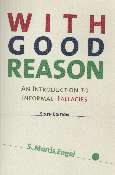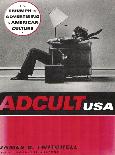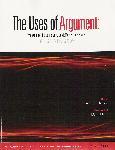|
|
 |
We are not teaching this course together
now due to our retirements
-- Claudio
and Louise |
Calendar Description
Examines different modes of
argumentation in editorial content, news coverage and
advertising, particularly ethical issues involved in the
relation between arguments based in logic and those based in
emotion. Other topics include rhetoric, persuasion, ideology and
propaganda
Prerequisites
For all students: 78 credits, or, for students with
equivalent preparation, permission of one of the Professors
Course Directors
Claudio
Duran
TEL 2069
Telephone 416-736-2100
x 30135
email cduran@yorku.ca
Course Consultation Hours TBA |
Louise Ripley
Atkinson 268C
lripley@yorku.ca (not
by
telephone)
Course Consultation Hours TBA |
Course Time and Location
Wednesday Nights 7-10 pm, TBA
(Early Tutorial 6-7, Lecture 7-9, Late Tutorial 9-10)
Catalogue Number: AP/ADMS
xxxxxx
AK/PHIL xxxxxx
AS/PHIL
xxxxxx
Organization of the
Course
This is the only truly imbricated course in the
Faculty of Liberal and Professional Studies,
taught by a Professor of Philosophy and a Professor of
Business, both together in the classroom with you for the entire
course, three hours a night, once a week for 26 weeks. You
will be taking responsibility for your learning as you read the
course materials and prepare to be active in in-class discussion
and small group work. To further aid in discussion, which is an integral
part of the course, starting around the end of September we offer an
early and late seminar led by both professors (you choose
one). This is an
on-campus course; only the course syllabus is here on the
web. There is one textbook, and a Course Kit containing a number of other readings, which may be purchased at the
York Bookstore.
Important Dates
Start
Date xxxxxx
End Date xxxxxx
Grade
Components Date xxxxxx
Last Day to Drop Without a Grade
xxxxxx
Last Day to Enrol Without
Permission of One of the Professors xxxxxx
Academic
Fees
Information About Helping Finance Your University
Education
Dates
for
Withdrawal and Return of Fees |
|
|
|
Course Readings and
Materials
Textbook
Engel, S. Morris (2000) With Good Reason: An
Introduction to Informal Fallacies. Sixth Edition. New
York: St. Martin's Press.
The Golden Sheets - Notes on Formal Logic (to be handed out in class) |
 |
Course
Kit of Readings
(on sale in the Bookstore; check in both ADMS and PHIL)
The Course Kit contains the
following articles and selections from texts:
|
| Plato Gorgias: Part
I. |
| Engel, S. Morris (1987)
The Chain of Logic Englewood Cliffs, New Jersey:
Prentice Hall, Chapter 3: "Syllogistic Logic." |
| Mandino, Og (1968)
The Greatest Salesman
in the World. New York: Bantam
Books,
Chapter 13: The Scroll Marked VI, p. 78-82. |
| Ripley, M. Louise (1999)
"The Creation of a Youth Culture: Distortion in a Dark
Glass." Emerging Issues in Business and Technology
Conference, Ethical Environmental and Social Responsibility
Track, October 28-30, Myrtle Beach, South Carolina. |
| Hunt, Shelby D. (2003)
Controversy in Marketing Theory: For Reason,
Realism, Truth, and Objectivity.
Armonk, New York: M.E. Sharpe, p. 10-17 and Figure 1-1:
Philosophy of Science Time Chart, p. 6-7.. |
| Twitchell, James B. (1996)
Adcult USA: The Triumph of Advertising in American
Culture. New York: Columbia University Press. Chapter 1:
p. 1-52. |
| Gilbert, Michael A. (1997)
Coalescent Argumentation. Mahwah, New Jersey:
Lawrence Erlbaum Associates, Publishers, Chapter
6: "Multi-Modal Argumentation" p. 75-88. |
| Gilbert, Michael A. (1994) "What Is An Emotional Argument, or Why Do
Argument Theorists Quarrel With Their Mates?" in
Gilbert, Michael A., Frans H.
Van Eemeren, Rob Grootendorst, J. Anthony Blair,
and Charles A. Willard (eds.) Analysis and Evaluation.
Proceedings of the Third International Society for the
Study of Argumentation Conference on
Argumentation (University of Amsterdam, June 21-24), Volume
II, p. 3-13. |
|
Ridolfo, Christine
(1998) "Multi-Modal Argumentation According to Michael Gilbert"
(student paper: critique of Gilbert) |
| Coulis, Laura
(2004) "The Unethical Use of Persuasive Argumentation in
Newspapers Covering the War in Iraq" (student paper
from this course the first time it was taught jointly) |
| Carozza, Linda (2002)
Traditional Argumentation Broadened. Masters Thesis,
University of Windsor: Chapter 3 "Visual Argumentation,"
pages 30-56; and Chapter 4 "Emotional Argumentation" pages
57-91. |
| Groarke, Leo (1996) "Logic,
Art and Argument" in
Informal Logic. Volume 18:Nos. 2 and 3, pages 105-129. |
| Ripley, M. Louise (2005)
"Arguing For the Ethics of an Ad: An Application of
Multi-Modal Argumentation Theory" in Hitchcock, David
(ed.) (2005) The Uses of Argument: Proceedings of a
Conference at McMaster University. Ontario Society for
the Study of Argumentation. |
| Rotfeld, Herbert Jack (2001)
Adventures in Misplaced Marketing. Westport,
Connecticut: Quorum Books: Chapter: p. 1-13 and Chapter 10:
p. 151-161. |
| Other than the Engel text
(WGR), all articles/excerpts from texts are included in
the Course Kit |
Warning:
Photocopying more than 10% of a textbook is illegal,
and may involve penalties.
Do not duplicate textbooks or obtain these
photocopies. |
|
| Supplementary Reading
Regular reading of a good daily newspaper and some of the
popular business magazines |
|
Topics and Readings |


|
1 September 7
Introduction to the Course
Come this first day and we will talk
about the course and explore how we will go about
combining the study of Philosophy and Business. You don't
need to have done any readings yet but you do need to come
with an open mind.
|
|

|
2 September 14
Plato (read
more about Plato
)
READINGS
Plato's Gorgias Part 1
(in Course Kit)
Read the whole thing through first, pages 3-27
Then read more carefully Chapters 1-4, kit pages 3-18
(page numbers refer to the numbers in Gorgias,
not course kit)
Duran's 7 chapter titles for Gorgias
Magazines: Start looking through magazines
and collecting ads
that interest you; you will need these
for the papers you will write |
|
 |
3
September 21
Plato
We will start the late seminar
tonight
Everyone come to class at 7:00; we
will meet together for the lecture until 9:00. Then those
who choose the late seminar can stay from 9-10. The early
seminar will take up the same material next week, September
28, from 6-7. We're starting early due to so much response from you,
wanting to talk more in class!
READINGS
Plato's Gorgias Part 1
(in Course Kit)
Read Chapters 5-7, kit pages
18-27
Think through your own interpretation of the Socratic Method
to discuss in class
Magazines: Look for ads that interest you, especially ones
that might illustrate Plato's points |
|
 |
4 September
28
Formal Logic
Early Seminar, 6-7 to
discuss Sept 21 material
Class 7-9
Late Seminar, 9-10 to discuss Sept 28 material
READINGS
Engel WGR
Preface, pages vii-x
Sections 1-2, pages 2-9,
Section 8, pages 39-43,
Section 5, pages 21-26
Magazines: Look for ads that interest you |
Exercises-WGR
p. 9-10, all
p. 51-52, all |
|
|
Wednesday, October 5 Rosh
Hashanah - No Classes |
|
Wednesday, October 12 Yom Kippur - No
Classes |
 |
5 October
19
Formal Logic
READINGS
Engel The Chain of Logic, Chapter 3:
"Syllogistic Logic" (in Course Kit, p. 26-35)
|
|
 |
6 October 26
Formal Logic
READINGS
Engel The Chain of Logic, Chapter 3:
"Syllogistic Logic" (in Course Kit, p. 26-35)
Read all The Golden Sheets
Find the valid moods |
Exercises-WGR
p. 26: #29, 30, 31, 35, 37, 38
p. 29: 40, 42, 44, 46
Golden Sheets Set 1, p. 3 iii) |
|
 |
7
November
2
Formal Logic
Early Tutorial 6 - 8 pm
Late Tutorial 8 - 10 pm
(Louise away at a
conference this week)
READINGS
The Golden Sheets |
Exercises-Golden
Sheets
Set 1, page 4: all exercises
Set 2, page 3: exercises 1,2,3,4,5,6,7,8,9,10 |
|
 |
8 November
9
Informal Logic
READINGS
Study in Chapter One: pages 35-38
Study in Chapter Three: pages 94-101 |
Exercises-Golden
Sheets Set 2, page 3: Exercises
11,12,13,14,15,16,17,18
Set 2, page 4: Exercises 1,2,6,9,11,13
|
|
 |
9
November 16
Informal Logic
READINGS
Golden Sheets Set 2, Page 4
WGR: Study pages 99-130 and 143-156
|
Exercises
Golden Sheets Set 2, Page 4: 3,4,5 (Use the poem now)
WGR:
pages 38-39: exercises 58-64
Exercises on pages 130 and after:
2,4,6,8,9,20,25,28,31,32,43,54
pages 156 and after: 2,3,4,5,10,12,16
Voluntary Assignment:
Do as many
as you want, but it is highly recommended that you do at
least a few. It is the best way to learn, and you will need
to know this for your papers later in the year. |
|

|
10 November 23
Informal Logic
READINGS
Golden Sheets Set 2, page 4
Read in WGR pages 158-174
Review in WGR pages 99-130 and 143-156
|
Exercises
Golden Sheets Set 2, p. 4, Exercises 6, 7, 8 (Use Poem)
WGR: pages 130 and on: Exercises 22,35,37,43,47,49,56,61
(b) pages 174 and on: 17,18,23,24,28,31,35 |
|
|
|

|
Christmas Break
|
|


|
13
January 4
Re-Entry: A Review of the First Term
Early Tutorial 6:00 - 7:30 pm
Late Tutorial 7:30 - 9:00 pm |
|

|
14
January 11
From Plato to Marketing
Early and Late Tutorial: Full Logical Analysis of
Arguments
READINGS: Og Mandino
(in Course Kit)
WGR: p. 15-17
Do Exercise 7 on p. 10
Lecture: Shelby Hunt: From Plato to Marketing
Overheads
on Shelby Hunt
Readings:
Shelby Hunt
(Course Kit) (Read more about Professor Hunt)
Natural Philosophy and the Rise of Science p.
10-17
Magazines: Begin looking for ads to
use in your March 1 paper
Take-Home Mid-Term Exam Due
Today |
|
 |
15
January 18
Advertising
Early Tutorial 6:00 - 8:00 pm
Late Tutorial 8:00 - 10:00 pm
READINGS
(we will discuss these in detail in the tutorials)
James B. Twitchell, Plop, Plop, Fizz,
Fizz (Course Kit p. 57-108)
Magazines: Gather ads to use in your March 1
paper |
|
 |
16
January 25
Michael Gilbert, Guest Speaker
Multi-Modal
and Coalescent Argumentation
Class from 7 to 9 pm, no seminars
After 9 p.m.: Return of Take-Home Assignments
and discussion of
First Essay Instructions
READINGS
Gilbert 1 "Multi-Modal Argumentation"
(Course Kit) (Read
more about Professor Gilbert)
Gilbert 2 "What is an Emotional Argument?"
(Course Kit)
Rifolfo, "Multi-Modal Argumentation According to Michael
Gilbert" (Course Kit) (all are on pages 109-127 of the
course kit)
Magazines: Gather ads to use in your March 1
paper
|
|
|
|
 |
Details of
First Essay
Assigned Today
Read about proper style in
Essay Writing, and about the
importance of both the
Epistemological Showdown and the "i"
statement" in good writing. We will be looking for
all of these in your essay. |
|

|
17
February 1 Propaganda and
the Press
READINGS
Laura Coulis "The
Unethical Use of Persuasive Argumentation in Newspapers
Covering the War in Iraq" (Course Kit)
Handout - Claudio Duran
Magazines: Gather ads to use in your March 1
paper
Copy of
Claudio's Notes for this Lecture
|
|
|
|
|
Note: |
Friday February 3: last date to
drop Fall/Winter course without receiving a grade |
|
 |
18
February 8
Visual Argumentation
Guest Speaker: Linda
Carozza
Class from 7 - 9
Early and Late Tutorials: Bring ads you are considering
using for your paper; the tutorial is an ideal place to try
them out
READINGS
Carozza "Traditional Argumentation
Broadened" (Course Kit, p. 160-186)
Groarke "Logic, Art and Argument" (Course Kit, p.
222-245))
Magazines:
Gather ads to use in your March 1 paper and final paper |
|

|
19
February 15
READING WEEK - NO CLASSES
|
|

|
20
February 22
Advertising Ethics and MMA
READINGS
Review: Gilbert "Multi-Modal Argumentation"
(Course Kit)
Ripley "Arguing for the Ethics of an Ad"
(Course Kit)
Magazines: Gather ads to use in your
March 1 paper, and final paper |
|
|
|

|
22
March 8
Marketing Ethics
READINGS
Herb Rotfeld on
Adventures in Misplaced Marketing Chapters 1 and 9
(Course Kit)
Magazines: Continue to collect ads to
use in your final paperClaudio is
ill; we will have class from 7 to 10, no tutorials
Bring your ads from your first essay and others you are
considering for your final paper. We will use them to talk
about how Rotfeld illustrates much of what Plato talked
about in the Gorgias |
|
 |
23
March 15
Student-led Seminars
Early Tutorial 6-8, Late
Tutorial 8-10
Free Consultation on Writing Your
Final Essay
Bring your ads for your paper to this seminar to present and
obtain help from Claudio and Louise and the class
Notes on Essay Writing from Louise's Talk |
|

|
24
March 22
Student-led Seminars
Early Tutorial 6:30-8, Late
Tutorial 8-9:30
Free Consultation on Writing Your
Final Essay
Bring your ads for your paper to this seminar to present and
obtain help from Claudio and Louise and the class |
|

|
25
March 29 Last Day of Classes
Class today is 7 to 9:15 p.m.
Evaluations
Three Presentations
Party! |
|
|
Wednesday April 5, 6:00 to 8:00 pm: Hand
in final exam substitute essay at Claudio's office, 2069 TEL. We
will both be there.
|
|
|
Getting
Started |
| What You
Will Need To Complete This Course |
| To be registered: unless you are registered
in this section of this course, I cannot grade your work |
Regular access
to a Yorku.ca student (or York employee) email
account:
Click here to activate
We use this for group work
correspondence and it's how I contact you individually |
|
Textbook and
Course Kit:
find these at the
York University Bookstore |
| Willingness to
keep up with the readings, to come to all
learning experiences offered for your benefit, to join
in the discussion, to know
how to write a proper essay, and to start early looking
for the ads that will form the basis of your written
work.
|
| Time to spend
during the entire course year on the
Final Exam Substitute
Essay |
|
|
|
| Course
Purpose/Learning Objectives
In addition to basic
learning objectives that are common to all courses
we both teach, in this imbricated course, the only one of its kind, we want you to make the stretch to combine the
two seemingly disparate disciplines of Philosophy and Business.
|
|
Expanded Course Description We
start with Plato and his concepts of argument and persuasion, move through
Formal and Informal Logic, look at the work of a modern day Marketing
scholar who bases his study of Marketing theory in Philosophy as it came
down to us through Plato, Socrates, and Aristotle, examine advertising as
it is seen by an advertiser and by scholars in Philosophy, and wrap up the course with chapters from Rotfeld's book, Adventures
in Misplaced Marketing, which, in its argument that marketing when
abused often results in outcomes not in the best interests of society, brings us full-circle back to Plato's work
in examining the ethics of persuading the masses, where we started in the
fall.
Claudio
and Louise started talking about this course more than twenty years ago when we both had
offices on the sixth floor of Atkinson College, Claudio already
established in Philosophy and Louise as a new Administrative Studies
professor unable to find office space with the rest of the ADMS
Department. Claudio holds his terminal degree in
Philosophy but one of his major research interests has always been
advertising. Louise holds her terminal degree in Marketing but one of her major
research interests has always been the influence of Philosophy in helping
us understand questions of ethics in business.
We both particularly love teaching here because it combines the
liberal arts and professional studies. For many years Claudio had
taught this course alone. A number of years ago, he started teaching it as a course
cross-listed between Philosophy and Administrative Studies with students
from both disciplines, and with Louise making guest appearances to talk
about Marketing. But it was always our dream to teach it
together. When the College changed its name
to the Joseph E. Faculty of Liberal and Professional Studies, they came up with a term for what we had been envisioning
all those years: an imbricated course; that is, a course taught jointly
by professors from both the liberal arts and the professions, and drawing on both disciplines to
help better understand particular phenomena common to Business and
Philosophy. This is the Faculty's first and only true imbricated course and
we are excited about teaching it together again and sharing our excitement with
you.
|

|
|
|
Evaluation
Summary and Description of Assignments
Effective writing is one of
the most important skills you can acquire in a
university course, and one that you will use in your
education, your career and your life; so too is the
skill of following instructions. All assignments require you to write well and to submit
work properly. Read carefully the full instructions on
this web site on Writing
Well for a Better Grade, on
References,
and on Format For Submitting
Work Properly, and check out the
Writing Programmes. Do not assume that because you have
written papers before you have mastered the art; writing
is something we continually work on to improve. Read
also the Appendix on Writing in Engel's book With
Good Reason. You will need to have read this to
prepare your final paper.
Assignment
Type
(All Individual Work) |
%
of Grade |
Due
Date
(7:00 pm, in the classroom) |
Description |
In-Class Quiz
Cancelled due to Religious Holiday Schedule |
10% |
Replaced by Hand-In
Assignments |
Exercises |
|
Take-Home Midterm Exam |
25% |
Due January 11 |
Questions/Exercises based on material from formal and
informal logic and a brief glimpse into ethics in
advertising |
|
Take-Home Essay |
25% |
Details Assigned
January 25
Due
March 1 |
8-10 page essay based on the study of argumentation in
the second term |
|
Final Essay |
40% |
Details Assigned
March 1
Due
April 5 |
20-25 page final essay based on the study of
argumentation in advertising |
NOTE: A student's final course
grade is not necessarily confined to a compilation of
marks earned on individual course components. Final
course grades may be adjusted to conform to Programme or
Faculty grades distribution profiles. The average mark in this
course is usually B/B+.
| If you
would like either a review of or a look at an
Introductory
Marketing course, click here to see the materials I use to
teach it
on the Internet |
|
|
Grading, Assignment Submission,
Lateness Penalties and Missed Tests
Grading
The grading scheme for the course conforms to the
9-point grading system used in undergraduate programmes
at York. For a full
description of York grading system see the
York
University Undergraduate Calendar.
Students may take a limited number of courses for degree
credit on an ungraded (pass/fail) basis. For full
information on this option see
Alternative Grading
Option and scroll down to "Grading."
Assignment
Submission To be submitted in
the classroom
Lateness
Penalty/Missed Tests: Talk to your
professors
|
|
|
About Your Professors
| We are
team-teaching this course again this year. Both of us plan to be
in the classroom with you each evening, for the duration
of the course.
Claudio Duran is a Senior Scholar at
York, an Associate Professor
of Philosophy and Social Science in the School of Analytic
Studies and Information Technology, and the School of
Social Sciences at the Faculty of Liberal and Professional
Studies. He has taught since July 1974. He has a Philosophy degree from the
University of Chile (equivalent to an M.A.) and undertook
post-graduate studies in Aesthetics and Art History at the
University of London, England. His area of research and
main teaching is interdisciplinary, and concentrates on
ideology, propaganda, and argumentation in the mass media.
He has several publications in this area.
Louise Ripley is a Professor of Marketing and in Women's Studies and Environmental Studies, with a PhD in
Management Studies (major in Marketing) from
University
of Toronto, an MBA in Finance from
Loyola University of
Chicago, and a Bachelor's degree from
Shimer,
one of the world's finest (and smallest) liberal arts
undergraduate schools. She worked in Finance and Marketing
Research in Chicago and has taught at York for over
twenty years. Most of her research is in the area of
multi-modal argumentation as applied to Advertising. She
presented a paper on the topic to the Ontario
Society for the Study of Argumentation in Hamilton in May
2005. Click
to find more about her professionally and personally on
Louise's web site.
|
|
|
IMPORTANT YORK POLICIES |
Academic Honesty and Integrity
York students are required to
maintain high standards of academic integrity and are
subject to the
Senate
Policy on Academic Honesty.
By staying in this course, you agree to abide by these
rules. Students should also review materials on the
Academic Integrity Website.
I expect that all work submitted by
individuals or groups is the work of only that
individual or group, for only this course, not having
been done for any other course in any way, by the
current members or any one else. You are welcome to talk
with anyone you like while preparing for any part of
this course, but what you put together and hand in must
be your own work and original to this course. Violation
of these premises is grounds for prosecution under the
rules of the Faculty and the University.
Read here York's new booklet,
"Beware! Says Who?
Avoiding Plagiarism"
Accommodation Procedures:
Deferred Standing
Talk to your professors about this.
Students with Special Needs
York University is committed to making reasonable
accommodations and adaptations in order to make
equitable the educational experience of students with
special needs and to promote their full integration into
the campus community. If you require special
accommodations, alert the Course
Director as soon as possible. Failure to notify the course director of
your needs in a timely manner may jeopardize the
opportunity to arrange for academic accommodation. Visit the
Counselling Centre
for more information.
Ethics Review Process
York students are subject to the York
University Policy for the Ethics Review Process for
Research Involving Human Participants. In particular,
students proposing to undertake research which involves
human subjects such as interviewing the director of a
company or government agency or having people complete a
questionnaire, are required to submit an Application
for Ethical Approval of Research Involving Human
Participants at least one month before you plan to begin
the research. If you are in doubt as to whether this
requirement applies to you, contact your Course Director
immediately.
Grade Component Deadline
The course assignment structure and grading scheme (i.e.
kinds and weights of assignments, essays, exams, etc.)
must be announced and be available in writing to
students within the first two weeks of classes. Please see
Important Dates.
Graded Feedback Rule
Under normal circumstances, students should receive some graded feedback worth at
least 15% per cent of the final grade for Fall, Winter or
Summer term, and 30% for full-year courses in the
Fall/Winter term prior to the final date for withdrawal
from a course without receiving a grade, with the following exceptions:
- graduate or upper level undergraduate
courses where course work typically, or at the
instructor's discretion, consists of a single piece of
work and/or is based predominantly or solely on
student presentations;
- practicum courses;
- ungraded courses;
- courses in Faculties where the drop
date occurs within the first three weeks of classes;
- courses which run on a compressed
schedule, e.g.: a course which accomplishes its academic
credits of work at a rate of one credit hour per two
calendar weeks or faster.
Note: Under unusual and/or
unforeseeable circumstances which disrupt the academic
norm, instructors are expected to provide grading schemes
and academic feedback in the spirit of these regulations
as soon as possible.
For more information, see the
Graded Feedback Rule.
Reappraisals
For reappraisal procedures and information, see
http://www.yorku.ca/laps/students/reappraisal.html
Religious Observance Days York University is committed to
respecting the religious beliefs and practices of all
members of the community and making accommodations for
observances of special significance to adherents. Should any
of the dates specified in this syllabus for in-class test or
examination, or for any scheduled lab, practicum, workshop
or other assignment pose a conflict for you, contact the Course
Director within the first three weeks of class and obviously
before the date that is a problem; you cannot do this
after-the-fact. To arrange an
alternative date or time for an examination scheduled in the
formal examination periods (December and April/May),
students must complete an
Online Examination Accommodation Form or pick one up
from the Student Client Services in the Student Services
Centre.
Student Conduct
Students and instructors are expected
to maintain a professional relationship characterized by
courtesy and mutual respect and to refrain from actions
disruptive to such a relationship. It is the responsibility of
the instructor to maintain an appropriate academic
atmosphere in the classroom, and the responsibility of the
student to cooperate in that endeavour. The
instructor is the best person to decide, in the first
instance, whether such an atmosphere is present in the
class. Read the full
Policy on Disruptive and/or Harassing Behaviour.
Twenty Percent (20%) Rule No examination or test worth more than 20% of the final
grade will be given during the last two weeks of classes
in a term, with the exception of classes which regularly
meet Friday evenings or any time on Saturday or Sunday.
|
|